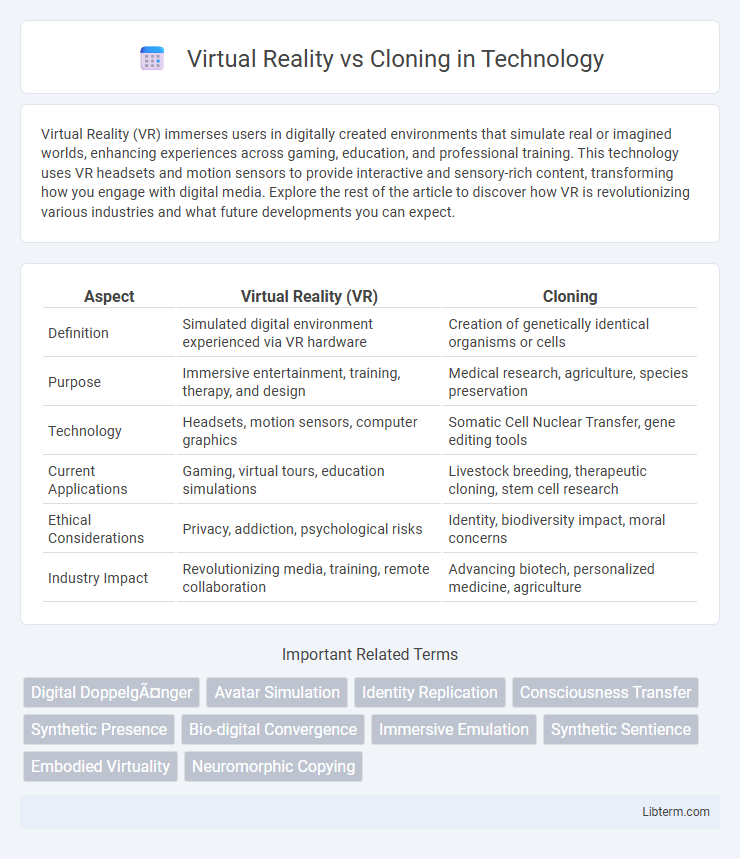Virtual Reality (VR) immerses users in digitally created environments that simulate real or imagined worlds, enhancing experiences across gaming, education, and professional training. This technology uses VR headsets and motion sensors to provide interactive and sensory-rich content, transforming how you engage with digital media. Explore the rest of the article to discover how VR is revolutionizing various industries and what future developments you can expect.
Table of Comparison
| Aspect | Virtual Reality (VR) | Cloning |
|---|---|---|
| Definition | Simulated digital environment experienced via VR hardware | Creation of genetically identical organisms or cells |
| Purpose | Immersive entertainment, training, therapy, and design | Medical research, agriculture, species preservation |
| Technology | Headsets, motion sensors, computer graphics | Somatic Cell Nuclear Transfer, gene editing tools |
| Current Applications | Gaming, virtual tours, education simulations | Livestock breeding, therapeutic cloning, stem cell research |
| Ethical Considerations | Privacy, addiction, psychological risks | Identity, biodiversity impact, moral concerns |
| Industry Impact | Revolutionizing media, training, remote collaboration | Advancing biotech, personalized medicine, agriculture |
Introduction to Virtual Reality and Cloning
Virtual Reality (VR) immerses users in computer-generated environments, enabling interactive experiences through devices like headsets and motion sensors. Cloning involves creating genetically identical copies of organisms or cells, primarily used in scientific research and medical applications. While VR transforms perception and interaction with digital worlds, cloning focuses on biological replication and genetic duplication.
Defining Virtual Reality: Key Concepts and Applications
Virtual Reality (VR) is an immersive technology that simulates a computer-generated environment, allowing users to interact with 3D spaces through devices like headsets and motion sensors. Key applications of VR span industries such as gaming, healthcare, education, and training simulations, offering experiential learning and remote interaction capabilities. Unlike cloning, which involves replicating biological entities, VR focuses on creating digital experiences to enhance human perception and engagement.
Understanding Cloning: Methods and Ethical Issues
Cloning involves creating genetically identical organisms through methods such as somatic cell nuclear transfer, which replaces the nucleus of an egg cell with that from a donor. Ethical issues in cloning center on concerns over identity, consent, and the potential for genetic abnormalities or exploitation. Understanding these ethical debates is crucial for evaluating cloning's implications in medicine and biotechnology.
Technological Foundations: VR vs Cloning
Virtual Reality relies on advanced computer graphics, motion tracking, and immersive display technologies to create simulated environments that replicate or enhance real-world experiences. Cloning is founded on biotechnological processes involving somatic cell nuclear transfer, genetic material replication, and cellular reprogramming to produce genetically identical organisms. While VR is driven by digital hardware and software, cloning depends on molecular biology techniques and genetic engineering principles.
Real-World Applications: VR in Society vs Cloning in Science
Virtual Reality (VR) revolutionizes sectors like education, healthcare, and entertainment by enabling immersive simulations and remote experiences, enhancing learning and therapeutic outcomes. Cloning advances scientific research in genetics and medicine, facilitating breakthroughs in organ transplantation, species preservation, and disease modeling. VR impacts daily societal interactions and industries, while cloning predominantly drives cutting-edge scientific innovation with profound ethical considerations.
Ethical Debates: Morality of Virtual vs Biological Replication
Ethical debates surrounding virtual reality and cloning center on the morality of replicating consciousness versus biological life. Virtual reality raises concerns about identity, consent, and the psychological impact of creating digital duplicates, while cloning questions the ethical implications of manipulating genetic material and the rights of the cloned being. Philosophers and bioethicists argue over the authenticity and dignity of synthetic experiences compared to natural biological existence.
Impact on Human Identity and Experience
Virtual Reality reshapes human identity by immersing users in simulated environments that challenge the boundaries between physical and digital self, enhancing experiential authenticity and cognitive adaptability. Cloning raises profound ethical dilemmas by replicating genetic identity, potentially disrupting traditional notions of individuality and uniqueness. The intersection of both technologies forces a reevaluation of what defines human experience, blending biological and virtual dimensions of existence.
Societal and Legal Implications
Virtual reality technology raises complex legal issues related to privacy, consent, and intellectual property as immersive digital environments increasingly replicate real-world interactions. Cloning poses profound societal and ethical challenges, including identity rights, bioethical boundaries, and the legal status of genetically identical beings. Both advancements demand comprehensive regulatory frameworks to balance innovation with individual rights and public safety.
Future Prospects: Innovations in VR and Cloning
Virtual Reality (VR) is poised to revolutionize entertainment, education, and healthcare through advancements in immersive experiences, haptic feedback, and AI-driven simulations that enhance user interaction and realism. Cloning technology, driven by breakthroughs in genetic engineering and CRISPR, promises future applications in medicine such as personalized organ regeneration, biodiversity conservation, and agricultural improvements. Innovations in both fields are accelerating rapidly, with VR expanding into metaverse development and cloning advancing towards ethical frameworks and therapeutic cloning solutions.
Conclusion: Comparing the Transformative Potential
Virtual reality revolutionizes user experience by creating immersive digital environments that enhance education, entertainment, and training sectors. Cloning offers profound implications in medicine and agriculture through genetic replication and biodiversity preservation. Both technologies hold transformative potential, with virtual reality advancing interactive experiences and cloning driving biological innovation and ethical debates.
Virtual Reality Infographic

 libterm.com
libterm.com